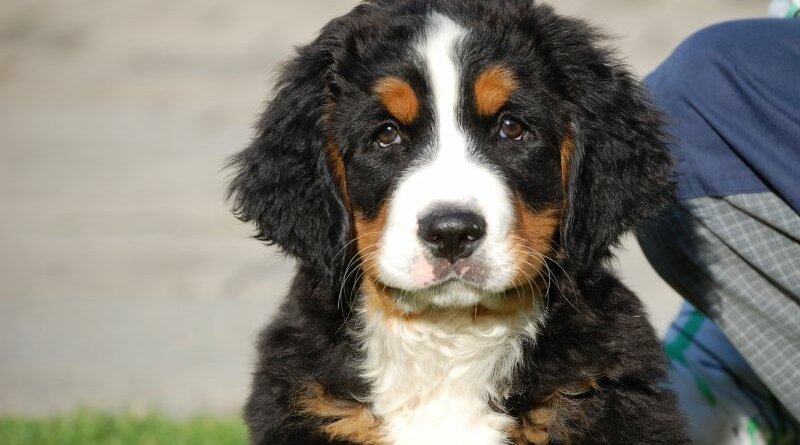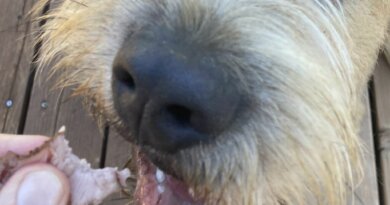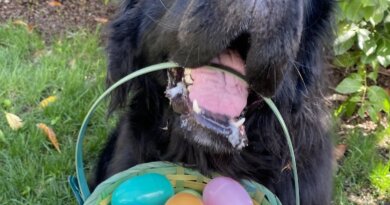So You Want A Bernese Mountain Dog?
This post may contain affiliate links. We may earn money or products from the companies mentioned in this post.
So you want a Bernese Mountain Dog?
You love their good natured temperament, large size, and majestic looks.
But what are the good, bad, and ugly about this large breed dog?
With a large frame, thick fur, and striking colors, a Bernese Mountain Dog isn’t an easy dog to miss. But who would want to?
This adorable breed has the look and temperament of a true gentle giant.
Though they may be quite sweet, and are certainly beautiful to look at, the Bernese Mountain Dog doesn’t rank as high on the popularity list as other sweethearts like the Golden Retriever.
Think you might like to know a thing or two about the Bernese Mountain Dog?
Read on for our nine facts about this noble breed.
9 Facts Good & Bad About The Bernese Mountain Dog
1. They Are One Of Four Types Of Swiss Mountain Dog
The Bernese Mountain dog may be the 20th (as of 2021) most popular breed in the United States, but it has three other cousins who have deep roots in Switzerland.
In fact, the first of these breeds were brought to Switzerland two thousand years ago when Roman soldiers invaded the area.
Once they gained popularity in Switzerland, the Bernese Mountain Dog, the Appenzeller Sennenhund, the Entlebucher Sennenhund, and the Greater Swiss Mountain Dog were all bred as drovers, draft dogs, and watchdogs for Swiss farmers.
In Switzerland, the Bernese Mountain Dog is known as the Berner Sennenhund, according to the AKC.
All four of the Swiss Mountain Dogs have similar coloring, but the Bernese Mountain Dog is the only one of the four to have thick, long fur. I love that soft, thick fur, except when it sheds.
Read on for more about their gorgeous coats.
2. Cold Weather Is Their Friend
With all that thick, gorgeous fur it’s no wonder farmers in the Swiss Alps loved these dogs! Bernese Mountain Dogs thrive in cold climates.
Their double coat keeps them warm in the frigid weather. But with so much fur, they have a tendency to shed a quite a bit.
Fortunately for any future “Berner” owner, these dogs don’t require much grooming. The AKC recommends just a small amount of daily brushing to get rid of tangles.
A daily brushing like this is generally enough to maintain their beautiful fur!
3. They Are Skilled Farm Dogs
Originally, the Bernese Mountain Dog was bred to be an all-purpose farm dog.
And to this day, they still shine in many areas of farm work. In fact, according to the Bernese Mountain Dog Club of America, they are able and willing to do most any task that is sent their way.
Traditionally, the Bernese Mountain Dog was best known for their drafting abilities – or more commonly called “carting.”
The Bernese used to pull carts full of milk products from farms all the way to villages for selling.
Today, Berners can still participate in drafting – either on a farm or in a competition!
The BMDCA hosts a Draft Test Program for Bernese Mountain Dogs and their owners.
These competitions offer up a chance to test out the traditional skills and abilities the Bernese are still so great at.
Another traditional farming skill that Bernese Mountain Dogs continue to compete in is herding.
Though they are not as strongly inclined towards herding as a Border Collie might be, Bernese Mountain Dogs still display strong herding instincts.
Many of them were traditionally used to herd cattle, which was very suited to their calm and gentle personalities.
My Aussie mix, Linus had the herding instinct. I’ll mention that Linus was never given a job to herd cattle but instead decided he’d herd my nieces and nephews. So, if you don’t give your Berner a job, be warned, she may take it upon herself to come up with her own job.
4. They Also Excel At Modern Activities
Did we mention that Bernese Mountain Dogs can do almost any task?
Well here is further proof! Not only to Bernese Mountain Dogs continue to perform traditional farming activities, but they compete in modern-day skill competitions as well.
You may be surprised to learn that one area the Bernese Mountain Dog excels in is agility.
Weighing upwards of 100 pounds, you may not expect a Berner to be particularly agile. But as we said, they love to work!
The Bernese Mountain Dog Club of America states that agility competitions can be exciting for dogs and their handlers who want the challenge of racing against the clock and navigating obstacle courses.
But not everything a Bernese Mountain Dog participates in is athletic. Many Bernese are being trained as therapy dogs, and excel in this area.
Berners are naturally affectionate towards humans, which makes them excellent candidates.
The BMDCA encourages anyone who wants to train their Bernese Mountain Dog in therapy work to give their puppy early and frequent socialization.
Some Bernese have a tendency towards shyness, and it’s important for a therapy dog to be social with people.
When Stetson was doing K9 Nosework we had four Bernese Mountain Dogs in our group! They weren’t fleet of foot when searching odors like our Stetson was. They moved a bit slower and were more methodical then our crazy Lab.
5. They Are Extremely Easy-Going
With all this talk about how hard-working the Bernese Mountain Dog is, you may think it’s all work and no play for a Bernese owner.
Think again! In addition to being strong, “calm” and “good-natured” are two of the chief personality traits the AKC looks for in a well-bred and healthy Bernese.
Bernese Mountain Dogs love their families. For complete happiness, being near them is all they need.
When they are in the home, they tend to be quiet, gentle, and eager to please. And they do well with children!
Since they were traditionally bred as drovers, pulling children in carts or wagons is a common (and fun!) activity Berners can do with their family.
The BMDCA notes that Bernese Mountain Dogs do not do well in isolation. They need to be with their families to remain calm and happy.
Without proper training and socialization, a Berner can become stressed or even act out.
6. Berners Don’t Bark Much
You might think a loud booming bark might be a common thing to hear from such a large and strong breed. Not so!
The Bernese Mountain Dog is actually a relatively quiet breed, and rarely barks or makes noise.
The AKC notes that to prevent any sort of barking or stress, it’s important to properly exercise your Bernese Mountain Dog.
As a working breed, this dog will have a lot of energy. And as a dog of a large size, it’s important to put that energy to good use!
Fortunately, Bernese Mountain Dogs love to work and love to be outdoors.
Hiking, cart pulling, running, or any other physical activity will suit them fine – so long as they are doing it with you!
The Bernese Mountain Dog Club of America also notes that a Bernese may become noisy or even destructive if left alone for long periods of time.
They are very social and attached to their families. For a calm and happy dog, it’s important to spend quality time with them.
7. They Are A Large Breed Dog
You probably already know this but the Bernese Mountain Dog is a large dog! If you’re used to your little Yorkie or Chihuahua then a Berner may not be the dog for you.
According to the AKC:
| Sex | Height | Weight |
|---|---|---|
| Male | 25-27.5 inches | 80-115 lbs |
| Female | 23-26 inches | 70-95 lbs |
That’s a definitely a notch up from our current pack:
| Name | Breed | Sex | Weight |
|---|---|---|---|
| Raven | Golden Retriever | Female | 70 lbs |
| Elsa | Labrador Retriever | Female | 50 lbs |
| Anna | Golden/Lab Mix | Female | 55 lbs |
That’s not to say we haven’t had dogs in that weight range. Our male Golden Retriever was a whopping 95 lbs. He was a bit of an oversized Golden.
If you’re thinking about a Berner just remember, they are large dogs.
8. Berners Are Prone To Health Problems
We’ve witnessed the health problems in Berners first hand. Stetson’s K9 Nosework buddies had hip dysplasia.
If you’re looking for to bring home a Bernese Mountain Dog you’ll want to check on health clearances.
Here’s a list of health clearances BMDCA recommends:
- AKC DNA Profile
- Hip Dysplasia
- OFA Evaluation OR
- PennHIP Evaluation OR
- OVC Evaluation
- Elbow Dysplasia
- OFA Evaluation OR
- OVC Evaluation
- Eye examination by a boarded ACVO Ophthalmologist
- Results registered with OFA OR
- Results registered with CERF
- Cardiac Evaluation by a boarded ACVIM Cardiologist
- Results registered with OFA
- DM DNA tests
- SOD1A and SOD1B-both required with the following exceptions;
- Clear by parentage to one generation
- At risk for one mutation
Check out the Bernese Mountain Dog Health Statement on AKC for more information.
9. Bernese Mountain Dogs Have A Short Lifespan
In 2005 I brought home my first ever dog, Linus as a responsible adult. Whether or not I was “responsible” is debatable.
Anyhow, a short 13 years later in 2018 I said goodbye to Linus.
Just one year later I said goodbye to my first guide dog puppy, Stetson.
Saying goodbye is difficult at best. Almost 5 years later I still struggle with the fact that my heart dogs, Linus and Stetson are gone.
Unfortunately, the lifespan for Bernese Mountain Dogs is short at only 7-10 years.
It’s tough saying goodbye every 13 years. Can you handle cutting that time in half?
Conclusion
I’ve always wanted a Bernese Mountain Dog. Their tricolor coats, soft wavy fur, and majestic looks have always drawn me to the breed.
It doesn’t hurt that I’ve met many of these gentle giants and found them to be easy going, good natured dogs.
However, there are definitely drawbacks to the Bernese Mountain Dog.
After losing Stetson and Linus at around 13 years old I can’t imagine losing a beloved pet after a short 7 years of life and love.
I’ve also witnessed the health issues Berners endure as 3 out of 4 of Stetson’s K9 Nosework classmates were suffering from hip dysplasia.
I believe the positives outweigh the negatives and someday you’ll see a Bernese Mountain Dog in my home.
Do you know a Bernese Mountain Dog?
Do they work?
Do they play?
Perhaps they do a bit of both! Let us know!
Save To Pinterest
Top Picks For Our Puppies
- BEST PUPPY TOY
We Like: Calmeroos Puppy Toy w/ Heartbeat and Heat Packs – Perfect for new puppies. Helps ease anxiety in their new home. - BEST DOG CHEW
We Like: Bones & Chews Bully Sticks – All of our puppies love to bite, nip, and chew. We love using Bully Sticks to help divert these unwanted behaviors. - BEST DOG TREATS
We Like: Crazy Dog Train-Me Treats – We use these as our high-value treats for our guide dog puppies. - BEST FRESH DOG FOOD
We Like: The Farmer’s Dog – A couple months ago we started feeding Raven fresh dog food and she loves it! Get 50% off your first order of The Farmer’s Dog.
Check out more of our favorites on our New Puppy Checklist.





